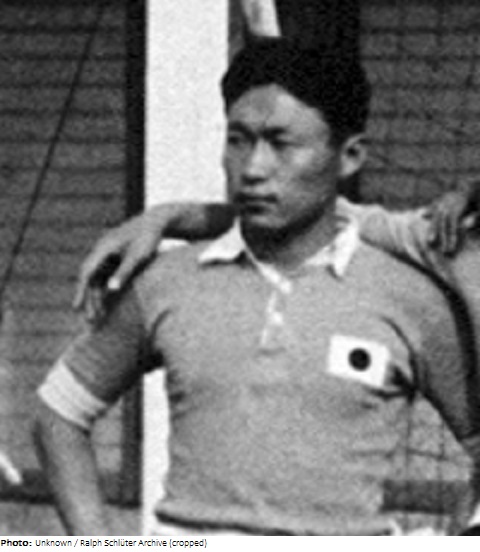Kim Yong-Sik

Biographical information
| Roles | Competed in Olympic Games |
|---|---|
| Sex | Male |
| Full name | Kim•Yong-Sik |
| Used name | Kim•Yong-Sik |
| Name order | Oriental |
| Original name | 김•용식 |
| Other names | Yoshoku Kin, 金 容植 |
| Born | 25 July 1910 in Sinchon, Hwanghaenam (PRK) |
| Died | 8 March 1985 in Seoul, Seoul (KOR) |
| Measurements | 172 cm / 65 kg |
| Affiliations | Bosung College, Seoul (KOR) / Gyeongju KHNP, Gyeongju (KOR) |
| NOC |  Japan Japan  Republic of Korea Republic of Korea |
Biography
The son of a church minister, Kim Yong-Sik began playing football at the age of seven. He later attended Kyungshin High School and eventually graduated from Boseong Technical School in 1937. In 1927, he started playing regularly for the Kyungshin school team, reaching the final of the Pyeongyang section of the All Joseon Football Championship. He was dismissed from his school for some time, because he was involved in the Gwangju Student Independence Movement. During this period, Kim was also active as a distance runner and speed skater. In 1933, he joined the newly formed Kyungsung FC, winning the Japanese Emperor’s Cup tournament in Tokyo in 1935, the only time that a club from outside Japan achieved this feat. The dynamic halfback was included in the Japanese football team for the 1936 Olympics in Berlin as the only Korean, under the Japanized name of Yoshoku Kin, and helped Japan upset Sweden in the “miracle of Berlin,” in which Japan came back to win in the second half from two goals down.
Beginning in 1937, Kim attended Waseda University in Japan and joined their football team. He only spent one semester at Waseda before returning to his home country of Korea to work as a reporter for the Dong-a Ilbo newspaper. He had to stop playing football but, in 1938, joined the former Boseong All-Stars, made up of the school’s former and present students. In the same year they won the Korean section of the All Japanese Football Championships, but ultimately lost the final against his former team from Waseda University.
In 1940, Kim joined Pyeongyang FC as a player-coach accompanied by a number of other Boseong All-Stars team members and played his last international game for Japan at the short lived Japan-dominated East Asian Games. In 1942, he represented the puppet state of Manchuria at these Games. From 1942-45 all regular sporting competitions ceased due to the War. When Korea was liberated from Japanese occupation, Kim rejoined the Boseong All-Stars. One year later he returned to his re-established former club Kyungsung FC, now called Seoul Football Club.
A South Korean squad was sent to compete at the 1948 Olympics in London, and Kim was selected to represent his country in both of Korea’s matches. He became player-coach of the Joseon Industries team immediately after the Olympics and remained until the outbreak of the Korean War in 1950. During the war he was a member of several military teams. Kim’s retirement from his active career in 1952 was marked by a special friendly match between the national team and a University selection with Kim as a guest player. He was selected to lead South Korea’s team during their first participation in the FIFA World Cup final in 1954. He was also on the coaching staff when Korea succeeded in the 1960 AFC Asian Cup. Domestically he acted for short periods as manager of Yangzee FC, Trust Bank and Hallelujah FC (later Goyang Zaicro FC). In 1982, Kim returned to Japan with the Christian football team of Hallelujah. He also held various positions in FIFA, the Korean Football Association and became Korea’s first international referee. He was posthumously awarded into the South Korea Order of Sport Merit (Fierce Tiger Medal) in 1985 and was one of the original inductees to South Korea’s Football Hall of Fame. Kim was deemed the father of Korean football after World War II.
Results
| Games | Discipline (Sport) / Event | NOC / Team | Pos | Medal | As | |
|---|---|---|---|---|---|---|
| 1936 Summer Olympics | Football (Football) |  JPN JPN |
Kin Yoshoku | |||
| Football, Men (Olympic) | Japan | =5 | ||||
| 1948 Summer Olympics | Football (Football) |  KOR KOR |
Kim Yong-Sik | |||
| Football, Men (Olympic) | Republic of Korea | =5 |